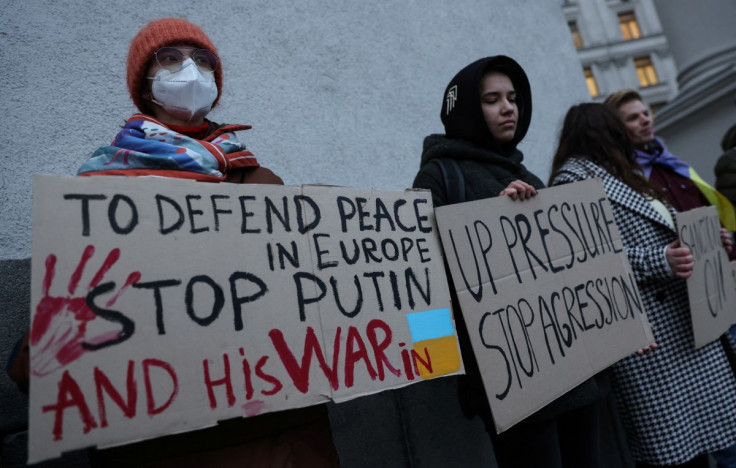EU Readies Sanctions, Says 'Russia Will Feel The Pain'

The European Union is close to agreeing sanctions on Russia that would put politicians and officials on blacklists, ban trading in Russian state bonds, and target imports and exports with separatist entities, senior EU officials said on Tuesday.
Russia's formal recognition of two breakaway regions in eastern Ukraine, is "illegal and unacceptable," European Council President Charles Michel and European Commission President Ursula von der Leyen said as they spelled out planned sanctions.
While EU member Germany's decision to put the Nord Stream 2 gas pipeline project on ice, is arguably the most far-reaching reaction to Moscow's moves, the bloc as a whole is planning a broad range of measures, they said.
"We've got to ensure that whatever happens, Russia will feel the pain ... to make sure Russia has absolutely no incentive to go further," Irish EU affairs minister Thomas Byrne said earlier on Tuesday.
The package of sanctions, which officials hope EU foreign ministers will agree on at a meeting starting in Paris at around 1500 GMT, includes putting on an EU blacklist those who were involved in the decision to recognise the breakaway regions.
That could involve all members of the lower house of the Russian parliament who voted in favour of the recognition, one EU official said.
The measures under discussion would also see a ban on trading in Europe of Russian state bonds and more generally "target the ability of the Russian state and government to access the EU's capital and financial markets and services, to limit the financing of escalatory and aggressive policies," the statement said.
Banks involved in financing separatist activities in eastern Ukraine could also be targeted.
The two regions could also be removed from a free trade deal between the EU and Ukraine, "to ensure that those responsible clearly feel the economic consequences of their illegal and aggressive actions," the statement said.
Taking steps to limit or ban Russia's access to the Belgium-based SWIFT global interbank payments system used for Russian money flows "is not part of this first package," an EU official said, without saying if it could be added on later on.
MORE SANCTIONS LATER?
More broadly, the measures under discussion on Tuesday are considered by the EU as a first round of sanctions.
"We can scale up the intensity depending on events on the ground," the EU official said.
"It's the first package, not the last package," the official said, adding that the EU coordinated its action with the United States overnight and that this was mirroring sanctions taken when Russia annexed Crimea in 2014.
The EU had repeatedly said it was ready to impose "massive consequences" on Russia's economy if Moscow invaded Ukraine but has also cautioned that, given the EU's close energy and trade ties to Russia, it wanted to increase sanctions in stages.
The EU was reacting "with robustness and speed to the illegal actions of Russia in close coordination with international partners," von der Leyen and Michel argued in their statement.
Not all of the bloc's 27 member states have the same relation to Russia or dependency on its gas, which could eventually complicate the adoption of sanctions - whether this package or potentially harsher ones at a later stage.
EU officials and diplomats have said some EU countries, including Austria, Hungary and Italy, Russia's closest allies in the bloc, would prefer more limited sanctions in response to Putin's move on eastern Ukraine.
Others want to see a fuller, tougher range of measures discussed in recent weeks for the event of a Russian invasion of Ukraine to be rolled out now. Baltic, central and eastern European states say tough sanctions should be imposed immediately as Russia is already showing military aggression towards Ukraine.
Italian Prime Minister Mario Draghi, whose country relies on Russian for much of its gas, told a news conference in Rome that any sanctions should not include energy imports.
"How we react as European Union will define our character and indeed the future of Europe," Lithuanian vice minister of foreign affairs Arnoldas Pranckevicius said at a meeting in Brussels.
© Copyright Thomson Reuters 2024. All rights reserved.





















